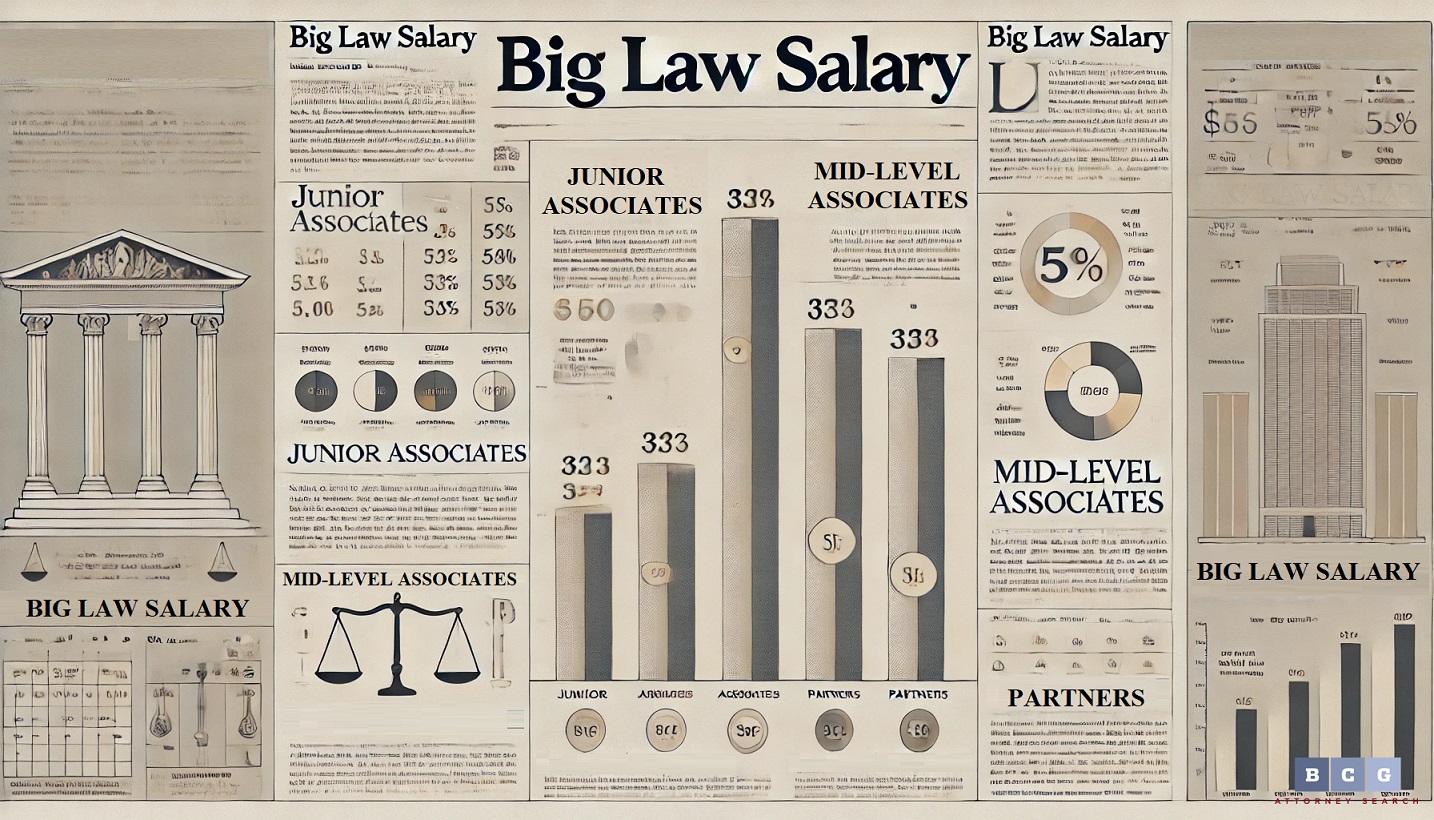
Billable Hours and Career Longevity
A story I often share illustrates the benefits of being with a firm that doesn't demand high billable hours and also does not pay that much. Early in my career, while clerking for a federal judge in Bay City, Michigan, I met attorneys from small firms around my age at young attorney mixers. Most of these attorneys, largely from regional law schools like the University of Detroit and Wayne State, are at the same firms they were at today than when I met them over two decades ago. They became partners and led stable careers, unlike many of my peers from the University of Virginia, who cycled through big firms, went in-house, or left the law altogether due to the high demands and burnout from large law firms.
- Chasing the next big payday can backfire—BCG’s insights on the career mistakes lateral attorneys make are worth reviewing before you make a move.
In my own experience, I saw the dark side of high salaries: extreme stress, substance abuse, divorces, and even criminal behavior. The high billable hour requirements took a toll on health and personal lives. Many attorneys I knew either left the practice or struggled to find stability and business development opportunities after years of intense work. The career trajectory of attorneys from small firms reflected stability compared to attorneys chasing high salaries early in their careers.
- If you want to approach compensation differently—not just chasing the highest number—refer to the ultimate guide to attorney salary negotiations to learn how to factor in work-life balance and long-term fulfillment.
See Related Articles:
- Billable Hours and Law Firm Economics: What Every Attorney Needs to Understand to Get Ahead
- The Ultimate Guide to Attorney Salary Negotiations: Maximizing Your Career and Life Balance
- How the Billable Hour Makes the Majority of Attorneys Dishonest and Unhappy
Evaluating Salary Beyond the Numbers
When considering a new firm, it's vital to understand the implications of billable hour requirements. These hours affect your health, relationships, mental state, and career control. Smaller firms often have more reasonable work hours, whereas larger firms may expect constant availability, impacting your quality of life. While evaluating trade-offs, consider our Attorney Compensation Strategy for insights on designing balanced pay structures.
- Our in-depth guide, The Hidden Costs of BigLaw, complements this analysis by examining the long-term effects of salary-driven decisions.
If you're moving to a firm with lower billable hour requirements or salary, you might actually make more money in terms of time saved and improved quality of life. Being the highest biller at a smaller firm can make you stand out, boost your self-esteem, job security, and partnership prospects, making you better of in the long run.
- If you want context beyond flashy headlines, check out the real deal with attorney salaries—salary hikes don’t always mean better career outcomes.
Bonuses and Employment Stability
Before negotiating salary, understand the bonus structure at the new firm. Sometimes, firms with lower base salaries offer bonuses that can match or exceed your current earnings. Also, assess the firm’s employment stability. How long do attorneys typically stay? Is there a path to advancement? High pay often comes with hidden costs, especially regarding job security and independence. Dive into this Q&A on the realities of BigLaw for context.
- Timing your move strategically matters more than chasing salary peaks—see BCG’s guide on the right time to change firms for clarity.
Culture and Career Development
The culture of a firm is critical. Feeling connected with your colleagues and sharing similar values can make your work life much more enjoyable. A good cultural fit often leads to better career opportunities and support from your peers and partners.
- For mid-level attorneys, salary isn’t everything—BCG’s seven critical choices for mid-career attorneys helps prioritize long-term stability.
For junior associates, prioritize training over salary. The first few years should be about gaining skills and experience. Additionally, consider the firm's stance on business development. Firms that encourage bringing in clients provide better long-term career stability.
- Before making a lateral leap for a pack-fresh salary, consider why hard-working attorneys might stay put—loyalty and continuity often pay off in subtle, lasting ways.
Responding to Salary Requirements
When asked about salary expectations, the best response is, "I would like to be paid the same amount that others in my class year are being paid." This shows you are reasonable and aligned with industry standards. If pressed, explain that your current salary reflects more than just the base pay and that other factors are important to you.
- Even if the top tiers can pay impressively—see the highest-paid attorney jobs in 2025 for the numbers—it’s important to assess if such compensation aligns with your overall career goals.
Ideally, get an offer first and then negotiate. Once a firm makes an offer, you have leverage and can discuss other aspects like work culture, advancement potential, and bonus structures.
- Those caught between financial pressures and career uncertainty may find Advice for Attorneys Struggling to Find Employment: Tips and Strategies for Success especially useful for navigating the search with balance.
See Related Articles:
Conclusion
Money is important, but it's not the only factor in choosing a law firm. Consider the long-term impacts on your health, relationships, and career stability. Avoid firms that pay poorly and offer no opportunities for growth. Protect yourself from being taken advantage of and seek a balance that ensures a fulfilling career.
1. Why might pursuing a high salary in a BigLaw firm be detrimental to an attorney's career and personal life?
Pursuing high salaries in BigLaw firms often comes with extreme stress, high billable hour requirements, and demanding work environments. These factors can lead to burnout, substance abuse, health issues, and strained personal relationships. Many attorneys find it challenging to sustain long-term careers in such settings, often cycling through firms or leaving the legal profession altogether. For a balanced approach that values both income and lifestyle, explore The Ultimate Guide to Attorney Salary Negotiations: Maximizing Your Career and Life Balance.For a comprehensive look at compensation beyond BigLaw, review the Complete Attorney Compensation Report 2025-2026.
2. How can smaller law firms offer a more stable career compared to larger firms?
Smaller law firms typically have more reasonable billable hour requirements, leading to better work-life balance and less stress. Attorneys in smaller firms often have longer tenures, more opportunities for partnership, and stable career progression. The supportive environment and manageable workload contribute to a more fulfilling and sustainable career.3. What should attorneys consider beyond salary when evaluating a new law firm?
Attorneys should consider several factors beyond salary, including billable hour requirements, firm culture, career development opportunities, bonus structures, and employment stability. Understanding how these aspects affect their health, relationships, mental well-being, and long-term career prospects is crucial for making a well-rounded decision.- For a deeper look at how compensation increases haven’t always improved life balance, read more on work-life balance vs. compensation in law.
4. Why is the culture of a law firm important for an attorney's career?
The culture of a law firm significantly impacts an attorney's job satisfaction and career development. A positive cultural fit can lead to a more enjoyable work environment, better support from colleagues, and increased opportunities for career advancement. Shared values and a collaborative atmosphere enhance overall job satisfaction and long-term career success.- For broader, overlooked guidance beyond salary dynamics, these career advice no one gives attorneys may reshape how you think about success.
5. How should attorneys respond when asked about their salary expectations during negotiations?
Attorneys should respond by stating, "I would like to be paid the same amount that others in my class year are being paid." This response shows that they are reasonable and aligned with industry standards. If pressed further, they should explain that their current salary reflects more than just the base pay and that other factors such as work culture, advancement potential, and bonus structures are also important to them. Ideally, attorneys should aim to get an offer first before negotiating specifics to have better leverage.- If you’re rethinking your approach to career growth—beyond chasing big salaries—discover how BCG Attorney Search transforms legal careers for a more strategic path.
Beyond salary concerns, one of the biggest risks attorneys face is becoming unmarketable. Learn how to protect your long-term career in How to Avoid Being Unmarketable as an Attorney.
About Harrison Barnes
No legal recruiter in the United States has placed more attorneys at top law firms across every practice area than Harrison Barnes. His unmatched expertise, industry connections, and proven placement strategies have made him the most influential legal career advisor for attorneys seeking success in Big Law, elite boutiques, mid-sized firms, small firms, firms in the largest and smallest markets, and in over 350 separate practice areas.
A Reach Unlike Any Other Legal Recruiter
Most legal recruiters focus only on placing attorneys in large markets or specific practice areas, but Harrison places attorneys at all levels, in all practice areas, and in all locations-from the most prestigious firms in New York, Los Angeles, and Washington, D.C., to small and mid-sized firms in rural markets. Every week, he successfully places attorneys not only in high-demand practice areas like corporate and litigation but also in niche and less commonly recruited areas such as:
- Immigration Law
- Workers Compensation
- Insurance
- Family Law
- Trust and Estate
- Municipal law
- And many more...
This breadth of placements is unheard of in the legal recruiting industry and is a testament to his extraordinary ability to connect attorneys with the right firms, regardless of market size or practice area.
Proven Success at All Levels
With over 25 years of experience, Harrison has successfully placed attorneys at over 1,000 law firms, including:
- Top Am Law 100 firms such including Sullivan and Cromwell, and almost every AmLaw 100 and AmLaw 200 law firm.
- Elite boutique firms with specialized practices
- Mid-sized firms looking to expand their practice areas
- Growing firms in small and rural markets
He has also placed hundreds of law firm partners and has worked on firm and practice area mergers, helping law firms strategically grow their teams.
Unmatched Commitment to Attorney Success - The Story of BCG Attorney Search
Harrison Barnes is not just the most effective legal recruiter in the country, he is also the founder of BCG Attorney Search, a recruiting powerhouse that has helped thousands of attorneys transform their careers. His vision for BCG goes beyond just job placement; it is built on a mission to provide attorneys with opportunities they would never have access to otherwise. Unlike traditional recruiting firms, BCG Attorney Search operates as a career partner, not just a placement service. The firm's unparalleled resources, including a team of over 150 employees, enable it to offer customized job searches, direct outreach to firms, and market intelligence that no other legal recruiting service provides. Attorneys working with Harrison and BCG gain access to hidden opportunities, real-time insights on firm hiring trends, and guidance from a team that truly understands the legal market. You can read more about how BCG Attorney Search revolutionizes legal recruiting here: The Story of BCG Attorney Search and What We Do for You.
The Most Trusted Career Advisor for Attorneys
Harrison's legal career insights are the most widely followed in the profession.
- His articles on BCG Search alone are read by over 150,000 attorneys per month, making his guidance the most sought-after in the legal field. Read his latest insights here.
- He has conducted hundreds of hours of career development webinars, available here: Harrison Barnes Webinar Replays.
- His placement success is unmatched-see examples here: Harrison Barnes' Attorney Placements.
- He has created numerous comprehensive career development courses, including BigLaw Breakthrough, designed to help attorneys land positions at elite law firms.
Submit Your Resume to Work with Harrison Barnes
If you are serious about advancing your legal career and want access to the most sought-after law firm opportunities, Harrison Barnes is the most powerful recruiter to have on your side.
Submit your resume today to start working with him: Submit Resume Here
With an unmatched track record of success, a vast team of over 150 dedicated employees, and a reach into every market and practice area, Harrison Barnes is the recruiter who makes career transformations happen and has the talent and resources behind him to make this happen.
A Relentless Commitment to Attorney Success
Unlike most recruiters who work with only a narrow subset of attorneys, Harrison Barnes works with lawyers at all stages of their careers, from junior associates to senior partners, in every practice area imaginable. His placements are not limited to only those with "elite" credentials-he has helped thousands of attorneys, including those who thought it was impossible to move firms, find their next great opportunity.
Harrison's work is backed by a team of over 150 professionals who work around the clock to uncover hidden job opportunities at law firms across the country. His team:
- Finds and creates job openings that aren't publicly listed, giving attorneys access to exclusive opportunities.
- Works closely with candidates to ensure their resumes and applications stand out.
- Provides ongoing guidance and career coaching to help attorneys navigate interviews, negotiations, and transitions successfully.
This level of dedicated support is unmatched in the legal recruiting industry.
A Legal Recruiter Who Changes Lives
Harrison believes that every attorney-no matter their background, law school, or previous experience-has the potential to find success in the right law firm environment. Many attorneys come to him feeling stuck in their careers, underpaid, or unsure of their next steps. Through his unique ability to identify the right opportunities, he helps attorneys transform their careers in ways they never thought possible.
He has worked with:
- Attorneys making below-market salaries who went on to double or triple their earnings at new firms.
- Senior attorneys who believed they were "too experienced" to make a move and found better roles with firms eager for their expertise.
- Attorneys in small or remote markets who assumed they had no options-only to be placed at strong firms they never knew existed.
- Partners looking for a better platform or more autonomy who successfully transitioned to firms where they could grow their practice.
For attorneys who think their options are limited, Harrison Barnes has proven time and time again that opportunities exist-often in places they never expected.
Submit Your Resume Today - Start Your Career Transformation
If you want to explore new career opportunities, Harrison Barnes and BCG Attorney Search are your best resources. Whether you are looking for a BigLaw position, a boutique firm, or a move to a better work environment, Harrison's expertise will help you take control of your future.
Submit Your Resume Here to get started with Harrison Barnes today.
Harrison's reach, experience, and proven results make him the best legal recruiter in the industry. Don't settle for an average recruiter-work with the one who has changed the careers of thousands of attorneys and can do the same for you.
About BCG Attorney Search
BCG Attorney Search matches attorneys and law firms with unparalleled expertise and drive, while achieving results. Known globally for its success in locating and placing attorneys in law firms of all sizes, BCG Attorney Search has placed thousands of attorneys in law firms in thousands of different law firms around the country. Unlike other legal placement firms, BCG Attorney Search brings massive resources of over 150 employees to its placement efforts locating positions and opportunities its competitors simply cannot. Every legal recruiter at BCG Attorney Search is a former successful attorney who attended a top law school, worked in top law firms and brought massive drive and commitment to their work. BCG Attorney Search legal recruiters take your legal career seriously and understand attorneys. For more information, please visit www.BCGSearch.com.
Harrison Barnes does a weekly free webinar with live Q&A for attorneys and law students each Wednesday at 10:00 am PST. You can attend anonymously and ask questions about your career, this article, or any other legal career-related topics. You can sign up for the weekly webinar here: Register on Zoom
Harrison also does a weekly free webinar with live Q&A for law firms, companies, and others who hire attorneys each Wednesday at 10:00 am PST. You can sign up for the weekly webinar here: Register on Zoom
You can browse a list of past webinars here: Webinar Replays
You can also listen to Harrison Barnes Podcasts here: Attorney Career Advice Podcasts
You can also read Harrison Barnes' articles and books here: Harrison's Perspectives
Harrison Barnes is the legal profession's mentor and may be the only person in your legal career who will tell you why you are not reaching your full potential and what you really need to do to grow as an attorney--regardless of how much it hurts. If you prefer truth to stagnation, growth to comfort, and actionable ideas instead of fluffy concepts, you and Harrison will get along just fine. If, however, you want to stay where you are, talk about your past successes, and feel comfortable, Harrison is not for you.
Truly great mentors are like parents, doctors, therapists, spiritual figures, and others because in order to help you they need to expose you to pain and expose your weaknesses. But suppose you act on the advice and pain created by a mentor. In that case, you will become better: a better attorney, better employees, a better boss, know where you are going, and appreciate where you have been--you will hopefully also become a happier and better person. As you learn from Harrison, he hopes he will become your mentor.
To read more career and life advice articles visit Harrison's personal blog.





